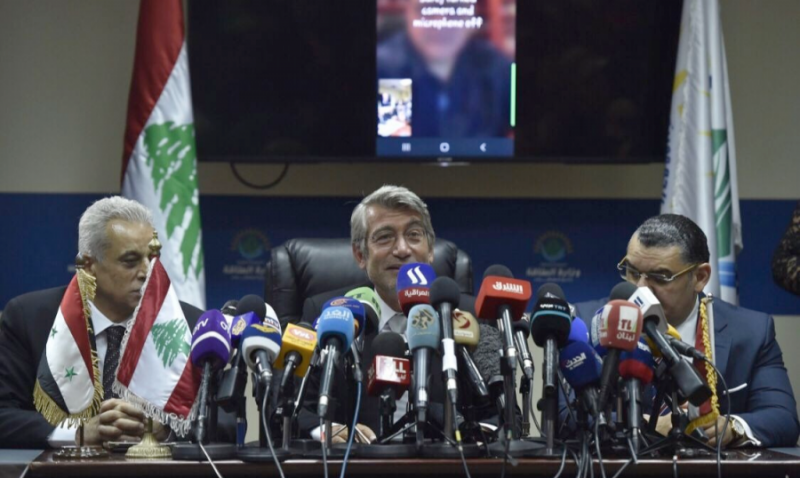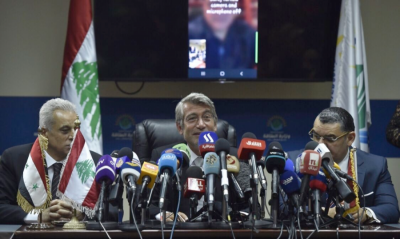On Tuesday, Lebanon, represented by the general directors of oil in Lebanon, Egypt, and Syria, signed a contract for the purchase of natural gas from Egypt and an agreement for the transportation and exchange of gas with Egypt and Syria. The signing ceremony was attended by the Egyptian ambassador to Lebanon, a representative of the Syrian ambassador, the chairman of the board of EGAS, the general directors of oil and gas, the Al-Rayan station in Syria, and legal advisors, along with numerous experts from Egypt, Syria, and Lebanon, as well as local and foreign media.
Energy and Water Minister Walid Fayad announced after the signing ceremony, "Today is a historic moment, as we signed the contract to purchase natural gas from the Arab Republic of Egypt and an agreement for the transportation and exchange of gas via the Arab Gas Pipeline with our brotherly countries, Egypt and Syria, to supply the Deir Ammar power plant." He added, "This signing would not have happened without Egypt's leadership embracing this project from the very beginning and following it closely, providing continuous support at all stages, reaching the point of securing an increased quantity to operate the plant at its full capacity. How can we forget that Egypt has always been ‘the mother of the world’ and the capital of the Arab League, as well as the gateway for Arabs."
He continued, "We also thank the Syrian Arab Republic and its leadership for providing all facilitation and removing all obstacles, whether on the technical level by securing the necessary quantity and quality of gas from the Homs fields or on the legal level by facilitating negotiations and finalizing the contract, as well as on the commercial level to ensure mutual interest."
He added, “Syria remains, in history and geography, a bridge, ensuring the passage of gas to Lebanon, and represents the natural extension of constructive Arab relations in pursuit of the interest of our countries and peoples.” Fayad emphasized that, "It is important to remind today that Lebanon, through its leadership, whether represented by the President, the Council of Ministers and its head, or the Parliament and its head, has given this project all the support and facilitation since the moment the government started working to reach this moment."
He pointed out that, "Lebanon agrees, across all its factions, on the importance of the Arab role in supporting Lebanon's recovery and emergence from its crisis during this critical phase." He further stated, "Lebanon has worked on this project with ongoing and continuous coordination with the World Bank, which provided its expertise and technical support and aided local leadership and its team in continuous meetings with the ministry to finalize the agreement and the funding conditions."
Fayad continued, "Thus, today marks the culmination of diligent work that began nine months ago, and it would not have reached this accomplishment without the serious work done by the teams in the three countries, making it a model for Arab-Arab cooperation in all its forms, where joint Arab work always enables us to benefit all Arab countries and peoples." He said, "The importance of this contract at the national level lies in the fact that when implemented, it will provide an additional four hours of electricity that Lebanon desperately needs, at the best possible cost, and that it will also contribute, along with electricity intake from Jordan, to diversifying Lebanon's energy sources."
He highlighted that, "Securing increased electricity supply remains a key aspect of addressing the daily needs of Lebanese citizens for additional electricity, water, and multiple services, along with reducing the cost of living, alongside the positive impacts on all economic and developmental aspects."
Fayad emphasized the initiatives undertaken to implement the agreement and secure the necessary prerequisites for obtaining the anticipated loan from the World Bank aimed at financing this project, which include:
- Preparing a national plan for the sustainable advancement of the electricity sector and its approval by the Council of Ministers.
- Preparing a Cost Recovery Plan for Electricité du Liban (EDL).
- Completing the rehabilitation project of the Arab Gas Pipeline in its Lebanese section after its awarding to the Egyptian TGS company, making it ready to start the pumping process.
- Concurrently completing all environmental and social studies related to the rehabilitation project and future pumping, publishing them on the ministry's and the World Bank's electronic sites.
- Securing financing and agreeing with the operators of the Deir Ammar plant and other production facilities to ensure the continuity of operation and maintenance.
- Developing a work plan between Electricité du Liban and distribution service providers to reduce waste, increase productivity, and ensure minimum funding for these companies to implement this plan and secure continuity and improve service.
- Awarding a financial audit firm to conduct a financial audit of Electricité du Liban through a tender overseen by the World Bank.
- Obtaining approval from the Ministry of Finance and the Central Bank to convert Electricité du Liban's revenues into dollars using the Sayrafa platform to settle its dues in foreign currency.
- Launching a tender to contract a consultant to design a Cash Waterfall Mechanism to ensure transparency in financial management.
- Initiating a bidding process to contract with a consultant to ensure compliance with World Bank loan conditions at various stages (Independent Verification Agent).
- Preparing a Project Operations Manual and drafting the project funding document by the financing partner: the World Bank.
He pointed out that, "The signing of this contract today completes the agreement made with Jordan and Syria for importing electricity from Jordan to Lebanon through Syrian territory." He added, "By implementing these two projects, we have completed the requirements of the first phase of the electricity plan, which aims to provide electricity supply between 8 and 10 hours daily by importing Jordanian electricity, buying Egyptian gas, and the Iraqi fuel agreement, in addition to other production sources such as hydroelectric plants and other renewable energy sources."
He continued, "We must also thank our brotherly Iraq for being among the first to support Lebanon by ensuring fuel for Electricité du Liban, enabling it to secure the minimum electricity supply." He emphasized that, "With the signing of these agreements, Lebanon, Egypt, Jordan, and Syria have fulfilled all legal, contractual, and technical requirements to move forward in ensuring electricity for the Lebanese people. We hope all obstacles have been removed to secure financing from the World Bank, as we look forward to obtaining final guarantees from the United States, particularly concerning sanctions."
He assured that, "Support from the United States and the international community will be essential to fulfilling the remaining requirements for implementing this project." Fayad concluded by thanking everyone who participated in the signing ceremony from Egypt, Syria, Lebanese, Egyptian, Syrian, and Jordanian teams, as well as the World Bank staff, who contributed diligently to achieving what was accomplished today. "Long live, long live the Arabs, long live Lebanon."




